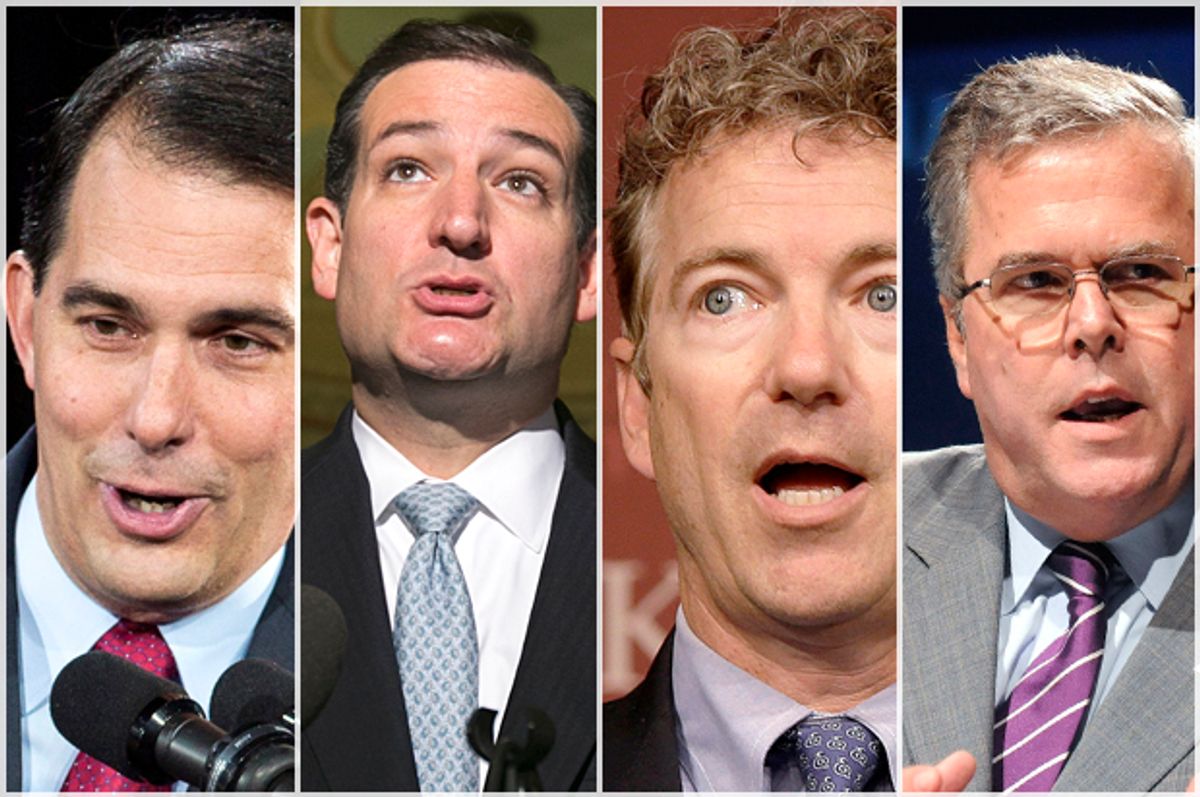The increasingly vigorous economic recovery has forced both Republicans and Democrats to recalibrate how they talk about economic policy. For the many months that job creation was limping along, Republicans would angrily demand to know where the jobs were, and Democrats would urge patience and point out how much better things were compared to the depths of the Great Recession. Once job creation picked up in earnest, Republicans changed gears, saying “yes, yes jobs whatever, but what about wages?” And Democrats, while certainly taking time to spike the football over each successive healthy jobs report, also began asking “yeah… what about wages?”
The Democratic shift arose out of the wreckage of the 2014 elections, when the party was forced to reckon with the reality that, even though the recovery was picking up, its economic message just wasn’t connecting with voters. As the American Prospect’s Harold Meyerson wrote at the time: “Democrats pointed to the economy’s recent growth, but apparently did so at their own peril: When 95 percent of the income growth since the recovery began goes to the wealthiest 1 percent … reports of a recovery strike most Americans as news from a faraway land.”
With the lessons of 2014 fresh in their collective memory and the 2016 election cycle about to start, progressive groups and Democrats have been making a sustained push to highlight policies to boost incomes for the poor and middle class and fight income inequality. The Democrats on the House Budget Committee outlined a plan in January to create a $1,000 tax credit for every worker making less than $100,000 annually, financed by eliminating some tax exemptions and deductions for high earners. The Center for American Progress released a series of policy recommendations for “ensuring that middle- and lower-income households are the substantial beneficiaries” of economic growth. And just yesterday the Economic Policy Institute released a report titled “How To Raise Wages” that offers a path to curing wage stagnation through smart economic policy.
A number of the policy ideas from CAP and EPI overlap and aren’t what you’d call “revolutionary,” though that’s not to take away from their worth. They endorse raising the minimum wage, infrastructure investment, stronger collective bargaining rights, paid sick leave, etc. EPI’s argument is straightforward and compelling: bad policy decisions helped create the extended period of wage stagnation we’re slogging through, so good policy decisions can help get us out of it.
On one level, papers and plans like these are aimed squarely at Hillary Clinton. It’s largely taken for granted at this point that she’ll be the 2016 Democratic nominee, and progressives groups would obviously like her platform to incorporate as many of their ideas as possible. Adopting a policy platform that incorporates strong progressive ideas would also help paper over some of the liberal unease with Clinton’s ties to Wall Street, and help convince voters that she’s actually invested in combatting economic inequality.
But the liberal and Democratic focus on wages is also needed to highlight how the newfound Republican concern over wages and inequality is entirely political and largely for show. Here again, EPI makes the case, arguing that the policies that have dominated the economic policy discussion for the last 30 years – tax cuts, deregulation, “bad trade deals,” and deep spending cuts – have helped produce an wildly unequal economy in which wages for the wealthiest have ballooned, while wages for everyone else have lagged far behind.
In predicting how Republican candidates will confront the issue of income inequality, Paul Waldman at the Washington Post ventures a pretty strong guess: they’ll say it’s a problem, and then propose to fix it by slashing taxes, deregulating big business, and cutting spending. Already we’re seeing signs of it happening. Jeb Bush’s Right to Rise PAC claims to be all about confronting economic inequality, but the proto-candidate himself is an ardent believer in tax cuts for the wealthy and just recently adopted the hardline conservative argument that the federal minimum wage should be abolished. Marco Rubio just recently put out a “middle class” tax proposal that aims a new tax credit at a narrow slice of the middle class while showering the wealthy with a fantastically generous tax cut bonanza.
The argument underlying these plans is that increased growth will naturally lead to shared prosperity – the rising tide that lifts all boats, as the popular phrase puts it. The Democrats have a strong case to make that those policies have done nothing but make the problem worse.

Shares